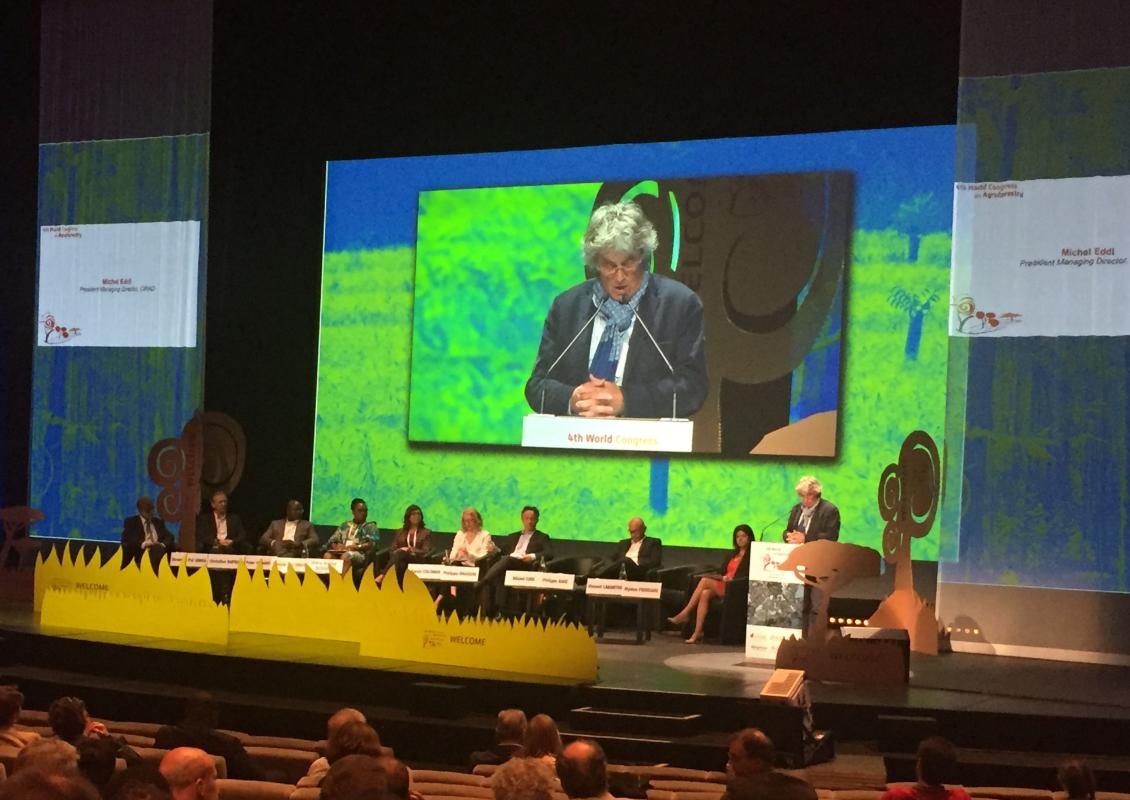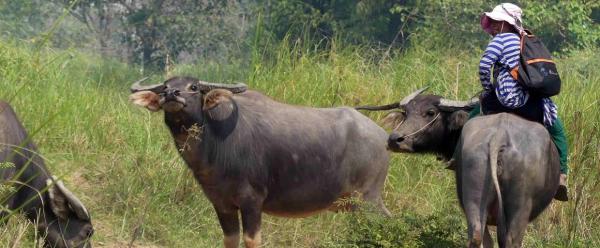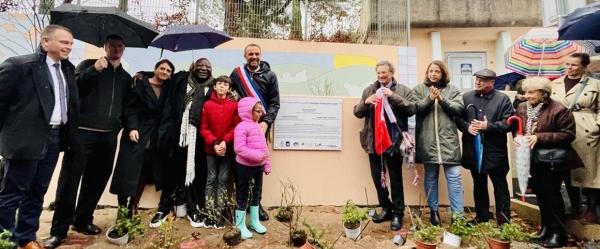- Home
- Press area
- Press releases
- Make Our Planet Treed Again
Montpellier Declaration: “Make Our Planet Treed Again”

CIRAD President Managing Director Michel Eddi officially opened the 4th World Congress on Agroforestry with INRA President Philippe Mauguin © S. Della Mussia, CIRAD
Over 300 presentations and over 600 posters presented the latest research on the power of mixing trees and crops in agriculture. Adding trees to crop fields and pastures delivers on biodiversity, while maintaining or enhancing food security and nutrition. In addition, it often leads to increased farm profitability and helps mitigate and adapt to climate change, while optimizing water management and restoring soils.
The Congress therefore calls upon decision-makers, both public and private, to ensure transformative change in governance, education and finance to speed up the adoption of agroforestry systems (read Montpellier Declaration below, published on 24 May).
It is encouraging to note that agroforestry has been gaining momentum worldwide. However, so far, this has mostly been a story of the global South. In Montpellier, for the first time, this World Congress saw an equal number of participants from temperate regions, where the surge in interest for agroforestry is more recent.
For Diaminatou Sanogo, Director of the National Centre for Forestry Research of Senegal’s Agricultural Research Institute (ISRA), enabling policies are essential. “The President of Senegal recently expressed the need for a transition to agro-ecology and asked agencies to develop new approaches. Agroforestry can contribute to agro-ecological intensification and climate resilience.” She is happy that her research group won the best poster award in the climate change category, with an innovation leading to greater nutrition security and resilience for farmers in the groundnut region of Senegal. Using native tree species intelligently with crops allows yield increases while greatly reducing fertilizer use.
Chad Frischmann, Research Director at Drawdown, emphasized that “12 of the top 20 climate solutions are in the food system, and many of those have to do with trees and agroforestry”.
Stephen Briggs, a leading agroforestry farmer from the UK, said “There is increasing interest in agroforestry across the globe and locally in the European Union as a system that provides greater economic and production resilience, which is important to help deal with the impacts of climate change. To help further adoption of agroforestry, what we now need is advice and mentoring from local, regional and global agroforestry networks, as farmers learn best from other farmers”.
According to Christian Dupraz, Scientific Chair of the Congress and INRA Research Director: “After the worldwide move towards simplified and artificialized agricultural systems – which came with many unintended negative consequences – agroforestry embraces complexity in agricultural systems”. "Faced with this complexity, we may feel that the more we learn, the less we know. This is why we need to collaborate and encourage transverse collaborations on all levels", said Tristan Lecomte, Chair of PUR PROJET, at the concluding session of the Congress.
It is important that tomorrow's agriculture mimics the processes of natural ecosystems so that some of the services that nature once gave us can be provided by agriculture. "Agroforestry can take up this challenge", concludes Emmanuel Torquebiau, Agroforestry Project Manager at CIRAD and Chair of the Organizing Committee of the Congress.
*that were documented in the recent IPBES report on biodiversity
Montpellier Declaration
Make our planet treed again!
At the 4th World Congress on Agroforestry held in Montpellier from 20th to 22nd May 2019, we, the 1200 delegates from 100 countries, agreed that the massive degradation of our world's biodiversity documented in the recent IPBES report is principally due to poor agricultural practices. Furthermore, agroforestry offers a key solution to remedy the situation while ensuring the continued food security of the planet's inhabitants.
The latest IPCC report on climate change gives the world a single decade to fundamentally transform much of its economy to reduce the risk of unmanageable climate change, and recognized that the transformation of global agricultural practices is crucial to meet that challenge.
The many presentations at the Congress noted that agroforestry is capable of maintaining or enhancing yields while mitigating carbon emissions, adapting to the increasingly frequent droughts and floods that climate change brings, restoring degraded soils and maximizing the overall productivity of landscapes for humanity and nature alike.
We, the participants, welcomed the increasing evidence that farmers around the world are beginning to recognize the importance of trees in their production systems, yet noted with concern that progress is still spotty and slow.
We therefore call on the world's political decision-makers, its corporate and financial leaders and its leading research institutions to rapidly and fundamentally engage in a process of deep transformation to promote the benefits of agroforestry to the world's landowners and land managers.
We consider that policymakers, governments and regulators must accelerate the design and rollout of legal, regulatory and support mechanisms to encourage the widespread adoption of agroforestry.
We encourage the private sector to develop financial and investment models to mobilize the capital resources necessary for the transformation of agricultural systems around the world to agroforestry.
We call on research institutions to prioritize the ongoing refinement of high-performance agroforestry systems appropriate to all farm sizes, climatic zones and income levels.
We stress the importance of collaborating to ensure that priority is given to the development and rollout of educational modules to landowners and land managers that help them to adopt agroforestry solutions appropriate to their particular contexts.
We are grateful to the agroforestry farmers of all countries who, through their wisdom and know-how, help protect the planet. We call on all other farmers to emulate them by inventing agroforestry options for tomorrow’s agriculture.
We further noted that agroforestry systems are usually profitable systems. What is costly is the agroforestry transition, which takes time and which must be supported. In fact, in the long term, the cost of transforming land use patterns to make them compatible with planetary health is either low or negative.
Managing our world to ensure it remains a pleasant and habitable place for our children and grandchildren is the overarching priority of our age. Agroforestry is one of the most effective tools in our global toolkit to achieve this result.
We, the delegates, therefore conclude that progress can be swift and results transformative. Make our planet treed again.



























